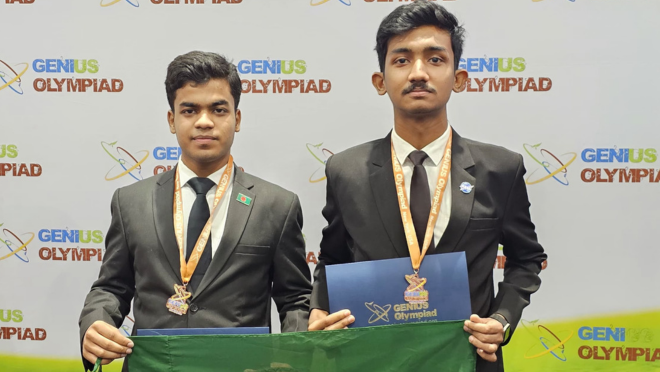Zabeer, Twashin bring home Bangladesh's first bronze at Genius Olympiad
Zabeer, Twashin bring home Bangladesh's first bronze at Genius Olympiad

Zabeer Zarif Akhter, a student of class 12 from St Joseph Higher Secondary School, alongside his teammate Md Twashin Ilahi from Shahid AHM Kamruzzaman Government Degree College, brought home bronze at the Genius Olympiad organised by Rochester Institute of Technology (RIT) in New York. Their signature invention, the Plasma Water Purification project was awarded this prestigious honour, a first for any Bangladeshi team and we’ve sat down with Zabeer to know more about his journey and his project aimed at finding a sustainably sourced solution to hernace purified drinking water.
Team formation
Zabeer had a knack for technology and innovation since his childhood. As a curious young kid, he used to be surrounded by electronics and always wanted to know the inner workings behind them. His partner Twashin is also quite similar. They both met at the 45th National Science & Technology Week at NSTC Agargaon where Zabeer participated. “We liked each other’s work and research, and the collaboration started for a competition in Indonesia,” Zabeer recalls. While the core research and development were carried out entirely by Zabeer, Twashin contributed significantly to documentation, submission processes, video and poster presentations, and website development.
The project
The idea for creating the plasma water purification project started by observing two of the significant challenges Bangladesh is facing today, one is the rising electric waste due to widespread consumption, and the need for purifying industrial water pollution in regions where heavy filtration is not logistically possible or restricted due to certain natural barriers. he explains, “As textile wastewater treatment is often costly and inefficient, I explored plasma technology as a more effective solution.”
His water purification system employs what scientists call Advanced Oxidation Process (AOP). “The high-voltage plasma water purifier employs several methods to remove contaminants from water,” Zabeer explains. “It uses shock waves and cell lysis to eliminate microorganisms and breaks down the chemical bonds of organic pollutants. The high voltage also generates Reactive Oxygen Species (ROS) that oxidise most of the pollutants.”
This also includes an AI powered water testing system. “In traditional water quality testing, most parameters require 5–10 days to analyse, involving century-old methods and complex laboratory procedures that can sometimes yield inaccurate results,” he notes. “In contrast, the AI-based rapid water testing system delivers results within seconds.”
The innovation is designed to overcome the limitations of traditional water testing, which can take over five days in professional laboratories such as Bangladesh Council of Scientific and Industrial Research (BCSIR) and International Centre for Diarrhoeal Disease Research, Bangladesh (icddr,b). This compact device, priced at just Tk1,500, uses spectroscopy and electrical measurements to detect contaminants. “It’s eco-friendly, affordable and novel, making it a viable solution where lab facilities are not accessible,” he adds.
The device has significant potential to impact water safety in disaster-prone zones, rural regions, and industrial settings. With its use of UV, IR, and Raman spectroscopy, it can detect pathogens, heavy metals, and volatile organic compounds with 97% accuracy.
“Users receive instant data, enabling them to take immediate action against contamination,” Zarif explains.
Both the purification and detection systems are designed with long-term sustainability in mind. “They require no maintenance and primarily utilise electronic waste, reducing environmental impact,” Zabeer explains. “The devices produce no harmful byproducts or emissions, making them safe for long-term use. Additionally, both systems can operate on solar power, further enhancing their sustainability.”
Overcoming obstacles
As expected, the lack of materials and resources available in Bangladesh to build such a project was the main hurdle in their plans. “I face various problems, especially I cannot find the necessary equipment in local shops and online platforms, so I need to order them from international platforms,” he shares. There’s also the issue of calibrating those equipment to meet certain criteria. Since there are very few testing facilities it was hard to test the efficiency and efficacy of the research.
Winning the bronze
Zabeer expressed the jubilation he felt when he landed at Rochester Institute of Technology (RIT). “The campus was very nice, especially the dormitories where we stayed.” The moment of victory also brought forth mixed and somewhat unexpected emotions. “We were surprised and honoured when we heard our name announced as bronze medal winners,” Zabeer reflects. “The Genius Olympiad is a very prestigious international competition with the highest country and participant affiliation among science and research project competitions.”
The competitive journey ahead
The Genius Olympiad is just one milestone in Zabeer’s journey. As he previously represented Bangladesh at the Stockholm Junior Water Prize finals in 2024, Zabeers is prepared to return to Sweden in 2025 as the sole national winner from Bangladesh. “I will represent Bangladesh solely at the Stockholm Junior Water Prize 2025 international finals in Stockholm, Sweden, as the sole national winner,” he announces proudly.
As Zabeer’s journey continues, he doesn’t forget his roots, he is a proud alum of Bogura Cantonment School and College. At the time of giving this interview, he graciously wanted to mention his school’s name reminiscing the good times he had there. He also encourages aspiring innovators to look for sustainable and real world solutions when choosing to build something unique. “My advice is to focus on solving real-world problems rather than chasing competitions or recognition,” he emphasises. “Many students work on already-developed ideas, which lack true innovation and impact.” He also adds, “Building rovers, drones, or planes without a meaningful purpose can be a waste of time for those who truly want to invent or serve their communities.”
Zabeer’s achievement serves as both inspiration and proof that with determination, creativity, and focus on real-world impact, young Bangladeshi innovators can compete with the best in the world.


